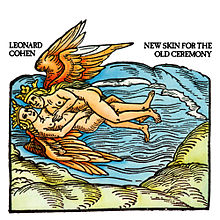|
New Skin for the Old Ceremony
New Skin for the Old Ceremony, released in 1974, is the fourth studio album by Leonard Cohen. On this album, he begins to evolve away from the rawer sound of his earlier albums, with violas, mandolins, banjos, guitars, percussion and other instruments giving the album a more orchestrated (but nevertheless spare) sound. The album is silver in the UK, but never entered the Billboard Top 200 in the US. A remastered CD was released in 1995, and in 2009 it was included in Hallelujah – The Essential Leonard Cohen Album Collection, an 8-CD box set issued by Sony Music in the Netherlands. CoverThe original cover art for New Skin for the Old Ceremony was an image from the alchemical text Rosarium philosophorum. The two winged and crowned beings in sexual embrace caused his U.S. record label, Columbia Records, to print one early edition of the album minus the image substituting instead a photo of Cohen.[citation needed] Another early manifestation of the cover art saw an additional angel wing collage added to cover the depicted figures, presumably to render the image more "decent". The image originally came to public attention in C. G. Jung's essay The Psychology of the Transference,[6] where it is held by Jung to depict the union of psychic opposites in the consciousness of the enlightened saint. The sexual embrace as a symbol for this condition of psychic unity is also found frequently in Tibetan thangkas (sacred paintings).[7][8] Track listingAll songs written by Leonard Cohen. Side one
Side two
Songs"Chelsea Hotel #2" refers to a sexual encounter in the Chelsea Hotel. For some years, when performing this song live, Cohen would tell a story that made it clear that the person about whom he was singing was Janis Joplin. Cohen would eventually come to regret his choice to make people aware that the song was about Joplin, and the graphic detail in which the song describes their brief relationship. In a 1994 broadcast on the BBC, Cohen said it was "an indiscretion for which I'm very sorry, and if there is some way of apologising to the ghost, I want to apologise now, for having committed that indiscretion."[9] In concert, a prolonged "I Tried to Leave You" was sometimes used to introduce the band. The 14-minute rendition from the 1985 Montreux Jazz Festival even featured extra lines given to the backup singers. "Who by Fire" explicitly relates to Cohen's Jewish roots, echoing the words of the Unetanneh Tokef prayer and sung as a duet with Janis Ian (also Jewish; her birth name is Janis Eddy Fink).[10][11] The song was written after Cohen's improvised concerts for Israeli soldiers in Sinai during the Yom Kippur War.[12] "Leaving Green Sleeves" is a reworking of the 16th-century folk song "Greensleeves". Cohen retains the chord progression and the words of the first two verses, but changes the melody and takes the latter verses in a different direction than the original. The song, and in turn the album, ends with Cohen violently screaming the chorus as the track fades out. On December 16, 2010, the Hammer Museum in Los Angeles showcased a series of eleven commissioned art videos inspired by songs from New Skin for the Old Ceremony. The project was curated by Lorca Cohen and Darin Klein.[13] The artists participating in the project were Brent Green, Alex da Corte, Wenston Currie, Theo Angell, Christian Holstad, Sylvan and Lily Lanken, "Lucky Dragons," Kelly Sears, Brett Milspaw, Peter Coffin, and Tina Tyrell.[14] On April 14, 2011, the program screened at the Museum of Modern Art in New York. Personnel
Songs for RebeccaShortly after this album, co-producers Lissauer and Cohen proceeded to work on its follow-up, Songs For Rebecca, which was abandoned after one side was completed.[citation needed] Five songs are known from their live performances during the North American tour of November 1975; they were reworked and recorded few years later – two of them with Phil Spector for Death of a Ladies' Man in 1977, and the other three on Recent Songs in 1979. Cover versionsPJ Harvey covered "Who by Fire" in the opening credits of the 2022 Apple TV+ series Bad Sisters.[15] "Lover Lover Lover" was covered by Ian McCulloch of Echo and the Bunnymen, scoring him a minor hit in the British charts in 1992. "Is This What You Wanted" was covered by The Last Shadow Puppets for their 2016 EP The Dream Synopsis. Buck 65 recorded "Who by Fire" as a duet with Jenn Grant as part of his 20 Odd Years project in 2010. Spanish folk singer Joaquín Sabina covered "There is a War" (Spanish title: "Pie de Guerra") in his 2005 album Alivio de Luto, with translated lyrics.[16][17] Charts
Certifications and sales
References
External links
|
||||||||||||||||||||||||||||||||||||||||||||||||||||||||||||||||||||||||
